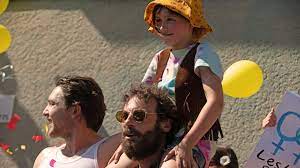209 total views, 1 views today
Fairyland 2023 Movie Review
Stories about the gay heyday of 1970s San Francisco — and the cruel chaser of the AIDS crisis the following decade — often hang on the notion of chosen family within the queer community: the bonds formed when blood ties are severed by prejudice. Studies of biological family, and parenthood especially, in that context are more unusual, which is what makes Alysia Abbott’s book “Fairyland: A Memoir of My Father” so moving. An account of her upbringing by a gay single father amid the LGBTQ liberation movement, and her subsequent nursing of him through AIDS, it balances an eager child’s-eye acceptance of counterculture living with an older woman’s melancholy over things unsaid or misspoken. In “Fairyland,” Andrew Durham adapts her story with warmth and sensitivity, though those perspectives are more fluently bridged on the page than on the screen.
A photographer making his feature-length debut as writer-director, Durham initially pursues a muzzily impressionistic style that bears the influence of producer Sofia Coppola — before switching tack to more standard-issue, dialogue-heavy storytelling as its young female protagonist drifts into adulthood. This tonal and aesthetic shift marks not just a coming of age but the passing of a freer, more bohemian era, though it does leave “Fairyland” feeling a touch lopsided. There’s an unforced authenticity to its portrait of ruptured early childhood that isn’t matched by its later, more melodramatic depiction of father-daughter warfare — even if its tear-jerking tactics are undeniably effective. That it’s affecting in both registers comes down to a performance of quiet, good-humored grace by Scoot McNairy, as a father undergoing his own journey of growth — a blossoming followed by a too-sudden wilting — over two decades.
In its introductory scenes, set in 1974, Durham trusts his audience to fill in certain blanks, as we intuit personal histories and relationship nuances amid the elisions of the script and the pooling shadows of DP Greta Zozula’s lovely, woozy 16mm lensing. As we open on scuzzy midwestern writer Steve (McNairy) receiving an early-hours call that his wife Barbara has been killed in a car crash, we receive information at approximately the same pace as (and often from the direct perspective of) his young daughter Alysia (winning newcomer Nessa Dougherty, who has something of Ana Torrent’s dark, porously inquisitive stare). Her grief largely internalized, she goes with life’s disrupted flow, not resisting when Steve — against the wishes of his starchy mother-in-law (Geena Davis) — decides they should load up their orange VW Beetle, move west and begin anew.
Arriving at a dilapidated San Francisco houseshare lorded over by kooky drug dealer Paulette (an oddly cast Maria Bakalova), Alysia is initially thrown by her groovy new home environment but adjusts soon enough, befriending the other roommates: genderqueer Johnny (Ryan Thurston) and especially guitar-strumming hipster Eddie (Cody Fern), with whom Steve also strikes up a rapport. Alysia is young and guileless enough that she doesn’t ask questions when, in one beautifully observed, understated scene, she finds the two men in bed together: She merely snuggles up to her dad, accepting of whatever new family unit comes her way.
Eddie doesn’t stick around, and nor do a succession of boyfriends (one played by a credible Adam Lambert) as Steve begins to live openly as a gay man. But queerness nonetheless becomes an unremarkable part of Alysia’s home life. “This is no longer the summer of love,” Pauletta drawls, but as Zozula’s camera weaves and soars through the sunlit masses at a Gay Pride parade, mirroring the young girl’s own beatific gaze, you might think otherwise.
That innocence doesn’t last, and neither does that acceptance. As we lurch forward in time to the mid-’80s, Steve’s sexuality has become a source of embarrassment — shame, even — to Alysia, now a New Wave-y high school sophomore played by a pinched, anxious Emilia Jones. The lensing turns crisper and grayer as the mood sours too: Steve, now a veteran of the city’s poetry scene, is still dating and dancing, but whispers of an unknown virus signal the beginning of the end. He struggles to reach his daughter, whose standard adolescent sullenness is further aggravated by questions about her parents she never previously thought to ask. She keeps his homosexuality a secret from her friends, whose thoughtless anti-gay jokes are a more perceptive signal of shifting sociopolitical tides in the Reagan era than the news headlines and radio reports that sporadically deliver clunky milieu updates.
There’s a roiling interior conflict in Alysia that neither the script nor Jones’ performance get to fully probe before looming tragedy pushes the drama into a higher key. Tweely decorative scenes of Alysia — now an NYU exchange student — living la vie belle in Paris only presage an inevitable, wrenching homecoming, punctuated redemptive confessions, apologies and voiceover addresses that feel a little too indiscriminately lifted from the text.
It says much for McNairy’s casual, hangdog sincerity as a performer that these passages occasionally feel over-written but never over-emoted: “Was I a good man?” he asks his daughter with a genuinely searching look, his voice slipping so easily over the premature past tense of the question that it breaks your heart in two, with or without the assistance of Michael Penn’s pretty, faintly maudlin piano score. At its most thoughtful, “Fairyland” conveys a dual sense of loss — spanning personal loves and lovers, and whole historical moments and communities — in such small, sweet gestures as a head on a shoulder, a hand in a hand, a silence finally understood.
